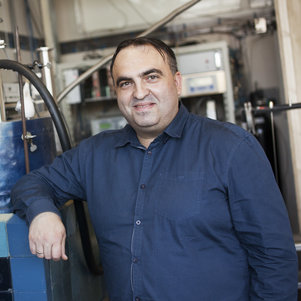TU Delft researchers provide part of the puzzle to produce alternatives for fossil fuels
In the quest to develop synthetic oils and fuels, TU Delft has successfully produced an in-situ cell that aids in understanding the process of catalysts. This achievement is part of research conducted in collaboration with Eindhoven University and the National Institute of Clean and Low-Carbon Energy.
This result demonstrates that the unique facilities at the TU Delft Reactor Institute, specifically Mössbauer spectroscopy in this case, are instrumental in investigating materials under real industrial conditions. Realistic experiments have been conducted in collaboration with key industry partners. This has proven to be a very reliable and established tool for high-pressure in-situ studies.
Fischer-Tropsch Technology
In this research, phase-pure χ-Fe-carbide was prepared and investigated, showing excellent catalytic performance. These catalysts produce valuable linear α-olefins under industrially relevant conditions, allowing access to important chemicals in the commercial Fischer-Tropsch technology. This technology can provide an alternative to fossil fuels by producing synthetic lubrication oil and synthetic fuel.
Long-term Commitment and confirmation
“Many of the Fe-carbides active in the Fischer-Tropsch process were first characterized using Mössbauer spectroscopy. The high penetrating power of gamma rays makes this spectroscopy a very versatile technique for studying catalysts in their working state (inside chemical reactors), providing promising routes to better understand the catalytic sites and opening pathways to synthesize novel or improved catalysts. Our group has been involved in this research field from its very beginning—about 45 years ago,” adds Dr. Iulian Dugulan, a researcher at the Fundamental Aspects of Materials and Energy at TU Delft Reactor Institute.
Our in-situ Mössbauer spectroscopy experiments confirmed the formation of phase-pure χ-Fe-carbide in the catalysts studied in this research.
Research and relevant technology
For this project, a unique state-of-the-art facility for high-pressure Mössbauer spectroscopy was used to study heterogeneous catalysts in their working state. This in-situ cell was developed by our group in collaboration with the Electronic and Mechanical Support Division (DEMO).
This research has the potential to develop a commercially relevant technology for the efficient production of long-chain linear α-olefins in the Fischer-Tropsch process.
Higher activity at lower temperatures
The newly characterized catalyst exhibits 1-2 orders of magnitude higher activity at lower temperatures than dedicated Fischer-Tropsch catalysts. The catalyst is stable for an extended period, yielding significant amounts of linear α-olefins while reducing unwanted CO2 production.
Impact on research
The use of the manganese promoter in these catalysts inhibits unwanted secondary reactions, thereby contributing to the high selectivity towards desired linear α-olefins. This research opens pathways to synthesize novel or improved catalysts by selecting different promoters in combination with other phase-pure active Fe carbides.
Practical applications
The industrialization of the new catalysts will inevitably require addressing process engineering challenges. However, the demonstrated high CO conversion, with high carbon efficiency, could also benefit other applications, such as the production of alcohols, aromatics, or jet fuels from syngas derived from conventional or renewable carbon feedstock.
Societal impact
Higher linear α-olefins are of vital importance for the chemical industry as versatile feedstocks and building blocks for various refining processes. They are crucial in the production of poly-α-olefins, linear low-density polyethylene, and as additives for high-density polyethylene production. They are also used in the production of surfactants, straight-chain alcohols, and the manufacturing of plasticizers.
Collaboration worldwide
This project has been coordinated by Prof. Emiel Hensen from the Laboratory of Inorganic Materials and Catalysis at Eindhoven University of Technology. The main author is Dr. Peng Wang, who is also affiliated with the National Institute of Clean and Low-Carbon Energy in Beijing, People’s Republic of China.
Next experiments
The next series of experiments on other innovative Fischer-Tropsch catalysts is already underway. The interesting results obtained will soon be published in another high-quality journal.
Publication
Abstract and full article in Nature: Efficient conversion of syngas to linear α-olefins by phase-pure χ-Fe5C2
More info and contact
Radiation Science & Technology - Fundamental Aspects of Materials and Energy, FAME

dr. A.I. Dugulan (Iulian)
- +31 (0)15 2785612
- A.I.Dugulan@tudelft.nl
-
Room: 2.01.380
